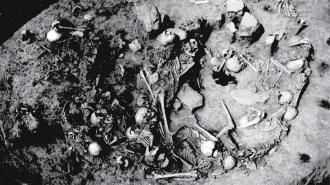Bad news for fans of the X-Men: It may take longer to create a new class of mutant superhumans than previous estimates suggested. The first direct measurements of human mutation rates reveal that the speed at which successive generations accumulate single-letter genetic changes is much slower than previously thought.
The study, published online June 12 in Nature Genetics, also shows that some individuals mutate faster than others. That means it may be fairly common for people to inherit a disproportionate share of mutations from one parent.
Researchers from an international collaboration known as the 1000 Genomes Project deciphered the genetic blueprints of six people from two families — a mother, father and child from each — and counted up the mutations inherited by each child. From there, the team calculated the human mutation rate.
“We all mutate,” says study coauthor Philip Awadalla, a population geneticist at the University of Montreal. “And the mutation rate can be extraordinarily variable from individual to individual.”
Combined with the results of three similar recent studies, the rate indicates that, on average, about one DNA chemical letter in every 85 million gets mutated per generation through copying mistakes made during sperm and egg production. The new rate means each child inherits somewhere in the neighborhood of 30 to 50 new mutations.
Previous measurements based on genetic comparisons between humans and chimpanzees had estimated the rate to be more than twice as fast. The discrepancy could mean that chimps and humans shared a common ancestor longer ago than many had thought.
Since no one had ever directly measured the human mutation rate, the researchers weren’t sure how much variation to expect. But the scientists did anticipate that fathers would hand down more mutations than mothers, due to a well-known phenomenon called male mutation bias. The effect stems from the fact that females are born with all the eggs they will ever have, but males produce new sperm all the time. Each time cells divide to make new sperm there’s a chance mistakes will happen in the DNA-copying process.
One of the two families the researchers examined — a mother, father and child of European descent — followed the expected pattern; 92 percent of the new mutations inherited by the child came from the father. But in the other family — a mother, father and child of Yoruban descent — only 36 percent of the mutations came from the father, meaning that the mother had the higher mutation rate.
“That’s very unusual. It’s surprising,” says Adam Eyre-Walker, an evolutionary biologist at the University of Sussex in Brighton, England. That doesn’t mean that male mutation bias doesn’t exist in humans, just that some women have faster mutation rates and some men have slightly slower ones. On average, men still rack up more DNA changes per generation than women do.
The reason for the variation in mutation rate is unclear. Genetic factors may make some people more prone to getting mutations or could beef up mutation-fixing machinery in others. Environmental factors and the age of the parents at the child’s conception might also influence the mutation rate, says Peter Keightley, an evolutionary geneticist at the University of Edinburgh. More, and larger studies of this kind will be needed to determine how much people’s mutation rates vary between individuals.







